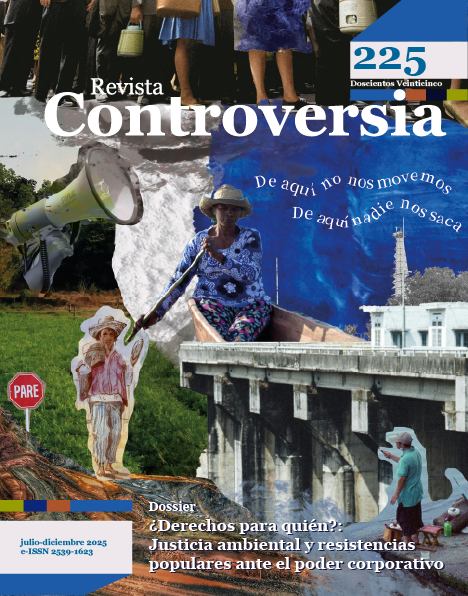Resumen
El concepto de resiliencia se ha consolidado como un marco dominante en la gestión del riesgo y las políticas de desarrollo, promovido como capacidad universal de adaptación frente a crisis. Este artículo cuestiona esa centralidad al examinar los límites ontológicos que restringen su aplicabilidad en contextos socioculturales diversos. Se argumenta que la resiliencia se inscribe en una ontología moderna que separa naturaleza y cultura, privilegia una temporalidad lineal y traduce la vida a métricas de adaptación, invisibilizando dimensiones espirituales, históricas y relacionales. A modo ilustrativo, se presentan referencias a comunidades indígenas del Cauca quienes, a través de la noción de pervivencia, conciben la continuidad de la vida no como mera absorción de impactos, sino como sostenimiento de vínculos territoriales, espirituales y políticos. Más que reemplazar la resiliencia, el artículo subraya la necesidad de reconocerla como una categoría situada y limitada, abierta al diálogo con otros horizontes ontológicos.
Referencias
Adger, Neil (2000). Social and ecological resilience: Are they related? Progress in Human Geography, 24(3), 347-364. https://doi.org/10.1191/030913200701540465
Adger, Neil (2006). Vulnerability. Global Environmental Change, 16(3), 268-281. https://doi.org/10.1016/j.gloenvcha.2006.02.006
Agrawala, Shardul (1998). Structural and process history of the Intergovernmental Panel on Climate Change. Climatic Change, 39(4), 621-642. https://doi.org/10.1023/A:1005312331477
Beckert, Jens (2019). Imagined futures: Fictional expectations and capitalist dynamics. Harvard University Press.
Berkes, Fikret (2007a). Community-based conservation in a globalized world. Proceedings of the National Academy of Sciences, 104(39), 15188-15193. https://doi.org/10.1073/pnas.0702098104
Berkes, Fikret (2007b). Understanding uncertainty and reducing vulnerability: Lessons from resilience thinking. Natural Hazards, 41(2), 283-295.
Berkes, Fikret y Folke, Carl (Eds.). (1998). Linking social and ecological systems: Management practices and social mechanisms for building resilience. Cambridge University Press.
Berkes, Fikret y Rose, Gloria (2013). Community resilience and culture in natural resource management. Journal of Environmental Management, 115, 1-9.
Berkes, Fikret y Ross, Helen (2013). Community resilience: Toward an integrated approach. Society & Natural Resources, 26(1), 5-20. https://doi.org/10.1080/ 08941920.2012.736605
Bernier, Quinn y Meinzen-Dick, Ruth (2014). Resilience and social capital in rural Ethiopia. World Development, 64, 87-102.
Bernier, Quinn y Meinzen-Dick, Ruth (2014). Resilience and social capital. (Conference paper 4). https://hdl.handle.net/10568/150102
Blaser, Mario (2013). Ontological conflicts and the stories of peoples in spite of Europe. Current Anthropology, 54(5), 547-568.
Bourbeau, Philippe (2018). On resilience: Genealogy, logics, and world politics. Cambridge University Press.
Brown, Katrina (2012). Policy discourses of resilience. En Climate change and the crisis of capitalism (pp. 37-50). Routledge.
Cardenas, Juan Camilo; Janssen, Marco y Bousquet, Francois (2015). Dynamics of rules and resources: Self-organization in irrigation. Ecological Economics, 120, 416-425. Cardenas, Juan Camilo; Rodríguez, Luz Angela y Johnson, Nancy (2015). Vertical collective action: Addressing vertical asymmetries in watershed management. Universidad de los Andes. https://hdl.handle.net/1992/8555
Centro Nacional de Memoria Histórica (CNMH) (2013). ¡Basta ya! Colombia: Memorias de guerra y dignidad. Chandler, David (2014). Resilience: The governance of complexity. Routledge.
Colding, Johan y Barthel, Stephan (2019). Exploring the social–ecological systems discourse 20 years later. Ecology and Society, 24(1), 2.
Cote, Muriel y Nightingale, Andrea (2012). Resilience thinking meets social theory: Situating change in social-ecological systems (SES) research. Progress in Human Geography, 36(4), 475-489. https://doi.org/10.1177/0309132511425708
Cretney, Raven (2014). Resilience for whom? Emerging critical geographies of socio-ecological resilience. Geography Compass, 8(9), 627-640. https://doi.org/10.1111/gec3.12154
Davoudi, Simin (2012). Resilience: A bridging concept or a dead end? Planning Theory & Practice, 13(2), 299-333. https://doi.org/10.1080/14649357.2012.677124
de la Cadena, Marisol y Blaser, Mario (Eds.). (2018). A world of many worlds. Duke University Press.
Descola, Philippe (2014). Beyond nature and culture. University of Chicago Press.
Donovan, Deanna y Puri, Rajindra (2004). Learning from traditional knowledge of non-timber forest products: Penan Benalui and the autecology of Aquilaria in Indonesian Borneo. Ecology and Society, 9(3).
Escobar, Arturo (2016). Autonomía y diseño: La realización de lo comunal. Editorial Universidad del Cauca.
Escobar, Arturo (2020). Pluriversal politics: The real and the possible. Duke University Press.
Estrategia Internacional para la Reducción de Desastres (EIRD) (2008). Informe de evaluación global sobre la reducción del riesgo de desastres. Naciones Unidas.
Evans, Brad y Reid, Julian (2013). Dangerously exposed: The life and death of the resilient subject. Resilience, 1(2), 83-98. https://doi.org/10.1080/216932 93.2013.770703
Ferguson, James (1990). The anti-politics machine: Development, depoliticization, and bureaucratic power in Lesotho. University of Minnesota Press. Folke, Carl (2006). Resilience: The emergence of a perspective for social-ecological systems analyses. Global Environmental Change, 16(3), 253-267. https://doi.org/10.1016/j.gloenvcha.2006.04.002
Folke, Carl (2016). Resilience (republished). Ecology and Society, 21(4), 44.
Folke, Carl; Carpenter, Steve; Walker, Brian; Scheffer, Marten; Elmqvist, Thomas; Gunderson, Lance y Holling, Crawford. (2005). Regime shifts, resilience, and biodiversity in ecosystem management. Annual Review of Ecology, Evolution, and Systematics, 35, 557-581. https://doi.org/10.1146/annurev.ecolsys.35.021103.105711
Foucault, Michel (2008). The birth of biopolitics: Lectures at the Collège de France, 1978-1979 (Michel Senellart, traductor). Palgrave Macmillan.
García, Carolina y Méndez-Fajury, Ricardo (2017). If I understand, I am understood: Experiences of volcanic risk communication in Colombia. En Carina Fearnley, Deanne Bird, Katharine Haynes, William McGuire y Gill Jolly (Eds.), Observing the volcano world (pp. 335-351). Springer. https://doi. org/10.1007/11157_2016_46
Gotham, Kevin y Campanella, Richard (2011). Coupled vulnerability and resilience: The dynamics of cross-scale interactions in post-Katrina New Orleans. Ecology and Society, 16(3), 12. https://doi.org/10.5751/ES-04292-160312
Grosfoguel, Ramón (2010). The epistemic decolonial turn: Beyond political-economy paradigms. En Walter Mignolo y Arturo Escobar (Eds.), Globalization and the decolonial option (pp. 65-77). Routledge.
Grove, Kevin (2014). Agency, affect, and the immunological politics of disaster resilience. Environment and Planning D: Society and Space, 32(2), 240-256. https://doi.org/10.1068/d4813
Holling, Crawford (1973). Resilience and stability of ecological systems. Annual Review of Ecology and Systematics, 4, 1-23. https://doi.org/10.1146/annurev.es.04.110173.000245
Joseph, Jonathan (2013). Resilience as embedded neoliberalism: A governmentality approach. Resilience: International Policies, Practices and Discourses, 1(1), 38-52. https://doi.org/10.1080/21693293.2013.765741
Kulkarni, Himanshu y Vijay Shankar, Parthsarathi Shridhar (2014). Groundwater resources in India: An arena for diverse competition. Local Environment: The International Journal of Justice and Sustainability, 19(9), 990-1011. https:// doi.org/10.1080/13549839.2014.964192
Kuhn, Thomas (1962). The structure of scientific revolutions. University of Chicago Press.
Lang, Thilo (2012). How do cities and regions adapt to socio-economic crisis? Towards an institutionalist approach to urban and regional resilience. Raumforschung und Raumordnung | Spatial Research and Planning, 70(4), 285-291. https://doi.org/10.1007/s13147-012-0170-2
Leichenko, Robin y O’Brien, Karen (2008). Environmental change and globalization: Double exposures. Oxford University Press.
Levalle, Sebastián (2020). Resiliencia y gestión del riesgo en territorios rurales del Cono Sur. Revista de Estudios Sociales, 74, 42-59.
Levalle, Sebastián (2022). Gestión del riesgo y territorialidades rurales: Experiencias desde el Cono Sur. CLACSO.
Luthar, Suniya; Cicchetti, Dante y Becker, Bronwyn (2000). The construct of resilience: A critical evaluation and guidelines for future work. Child Development, 71(3), 543-562. https://doi.org/10.1111/1467-8624.00164
MacKinnon, Danny y Derickson, Kate (2013). From resilience to resourcefulness: A critique of resilience policy and activism. Progress in Human Geography, 37(2), 253-270. https://doi.org/10.1177/0309132512454775
Manyena, Bernard; O’Brien, Geoff; O’Keefe, Phil y Rose, Joanne (2011). Disaster resilience: A bounce back or a bounce forward ability? Local Environment, 16(5), 417-424. Miller, Andrew y Davidson-Hunt, Iain (2010). Fire, agency and scale in the creation of Aboriginal cultural landscapes. Human Ecology, 38(3), 401-414. https://doi.org/10.1007/s10745-010-9325-3
Miller, Fiona; Osbahr, Henry; Boyd, Emily; Thomalla, Frank; Bharwani, Sukaina; Ziervogel, Gina, … Nelson, Donald (2010). Resilience and vulnerability: Complementary or conflicting concepts? Ecology and Society, 15(3), 11. https://www.ecologyandsociety.org/vol15/iss3/art11
Moller, Henrik; Berkes, Fikret; Lyver, Philip y Kislalioglu, Mina (2004). Combining science and traditional ecological knowledge: Monitoring populations for comanagement. Ecology and Society, 9(3), 2. https://www.ecologyandsociety.org/vol9/iss3/art2
Mosse, David (2006). Collective action, common property, and social capital in South India: An anthropological commentary. Economic Development and Cultural Change, 54(3), 695-724. https://doi.org/10.1086/500034
Mosse, David (2013). The anthropology of international development. Annual Review of Anthropology, 42, 227-246. https://doi.org/10.1146/annurev-anthro-092412-155553
Nightingale, Andra (2015). Adaptive scholarship and situated knowledges? Hybrid methodologies and plural epistemologies in climate change adaptation research. Area, 47(4), 411-418.
Oliver-Smith, Anthony. (2009). Anthropology and the political economy of disasters. En Eric C. Jones & Arthur D. Murphy (Eds.), The political economy of hazards and disasters (pp. 11–28). AltaMira Press.
Osorio, Flor (2009). Territorialidades en suspenso: Entre sobrevivencia y resistencia, identidades y territorialidades en suspenso. Codhes, Colciencias.
Pahl-Wostl, Claudia (2009). A conceptual framework for analysing adaptive capacity and multi-level learning processes in resource governance regimes. Global Environmental Change, 19(3), 354-365. https://doi.org/10.1016/j. gloenvcha.2009.06.001
Parra, Efraim (2023). From resilience to pervivencia: Constructing other possible worlds in the rural areas of Cauca, Colombia [Tesis de doctorado, University of Edinburgh]. https://hdl.handle.net/1842/40783
Peralta, Henry (2019). Gestión del riesgo comunitario en Colombia. Corporación OSSO.
Peralta, Henry (2021). Resiliencia y preparación comunitaria. Editorial Pontificia Universidad Javeriana.
Perrings, Charles (2006). Resilience and sustainable development. Environment and Development Economics, 11(4), 417-427. https://doi.org/10.1017/S1355770X06003020
Quijano, Aníbal (2000a). Coloniality of power and Eurocentrism in Latin America. International Sociology, 15(2), 215-232. https://doi.org/10.1177/0268580900015002005
Quijano, Anibal (2000b). Colonialidad del poder, eurocentrismo y América Latina. En Edgardo Lander (Ed.), Colonialidad del saber: Eurocentrismo y ciencias sociales. Perspectivas latinoamericanas (pp. 201-246). CLACSO, Unesco.
Rappaport, Joanne (1998). The politics of memory: Native historical interpretation in the Colombian Andes. Duke University Press.
Schmidt, Jessica (2015). Intuitively neoliberal? Towards a critical understanding of resilience governance. European Journal of International Relations, 21(2), 402-426. https://doi.org/10.1177/1354066114537533
Scoones, Ian (1999). New ecology and the social sciences: What prospects for a fruitful engagement? Annual Review of Anthropology, 28(1), 479-507. https://doi.org/10.1146/annurev.anthro.28.1.479
Simmie, James y Martin, Ron (2010). The economic resilience of regions: Towards an evolutionary approach. Cambridge Journal of Regions, Economy and Society, 3(1), 27-43. https://doi.org/10.1093/cjres/rsp029
UNDRR (2015). Sendai Framework for Disaster Risk Reduction 2015–2030. United Nations.
UNISDR (2005). Hyogo Framework for Action 2005–2015: Building the resilience of nations and communities to disasters. United Nations.
Viveiros de Castro, Eduardo (2015). The relative native: Essays on indigenous conceptual worlds. HAU Books. Walker, Brian y Salt, David (2006). Resilience thinking: Sustaining ecosystems and people in a changing world. Island Press. Walker, Jeremy y Cooper, Melinda (2011). Genealogies of resilience: From systems ecology to the political economy of crisis adaptation. Security Dialogue, 42(2), 143-160. https://doi.org/10.1177/0967010611399616
Weart, Spencer (2003). The discovery of global warming: A history. Harvard University Press.
Ziervogel, Gina; Cowen, Anna y Ziniades, John (2016). Moving from adaptive to transformative capacity: Building foundations for inclusive, thriving, and regenerative urban settlements. Sustainability, 8(9), 955. https://doi.org/10.3390/su8090955





